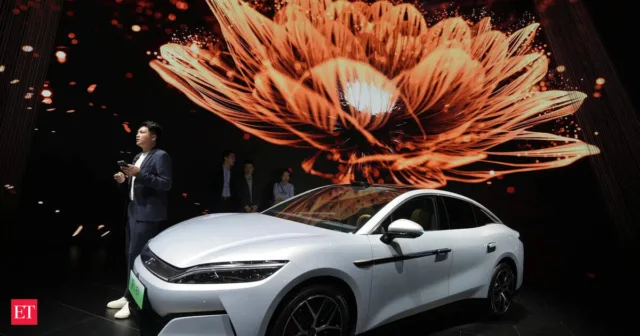
Huawei EV battery breakthrough promises 3,000 km range with 5-minute charge—game-changer or just lab hype?- Huawei is making headlines in the EV world with a new patent that could completely transform how we think about electric vehicle batteries. The Chinese tech giant, known for its innovations in telecom and consumer electronics, has claimed to develop a solid-state EV battery capable of delivering a staggering 3,000 km driving range on a single charge. What’s more, this next-gen battery can reportedly charge from 0 to 100% in just 5 minutes.
Filed recently, the patent details a nitrogen-doped sulfide electrolyte-based battery that offers a remarkable energy density of 400–500 Wh/kg, more than double or triple the capacity of traditional lithium-ion batteries. If Huawei can pull this off outside a lab, it might rewrite the rules of the electric vehicle industry.
What makes Huawei’s solid-state EV battery so different?
The core of Huawei’s innovation lies in the nitrogen-doped sulfide electrolyte. This component is designed to tackle two major hurdles faced by solid-state batteries—stabilizing the lithium interface and minimizing harmful side reactions, which often derail performance in real-world use.
Thanks to this upgraded electrolyte, Huawei claims the battery can reach energy densities up to 500 Wh/kg, compared to around 250 Wh/kg in current lithium-ion tech. That’s the key reason the driving range can soar to 3,000 km on a single charge (as per the CLTC—China Light-Duty Vehicle Test Cycle). Even by the stricter EPA cycle, it still holds above 2,000 km, which is far beyond any EV currently on sale globally.
Huawei’s battery breakthrough leaves Tesla racing to catch up
Huawei has stunned the EV world by unveiling a solid-state battery that promises a jaw-dropping 3,000 km range (1,860 miles) and an ultra-fast 5-minute full charge. While still in the patent stage, the battery features sulfide-based solid-state chemistry and 400–500 Wh/kg energy density—far beyond Tesla’s current lithium-ion technology. Though real-world application is years away, this bold innovation signals that Chinese tech giants like Huawei and EV makers like BYD are fast becoming threats to Tesla’s dominance.
Key Huawei battery highlights:
- 3,000 km theoretical range (vs Tesla’s ~500 km)
- Full charge in ~5 minutes (Tesla takes 15–30 min for partial charges)
- 2x–3x energy density of Tesla’s current batteries
- Still in development—not commercially ready yet
Tesla stock feels the heat as Chinese EV firms surge
Following Huawei’s battery news and BYD’s 5-minute charging breakthroughs, Tesla stock saw a modest decline, while Chinese EV leaders gained momentum. Tesla is still ahead in infrastructure and reliability, but its stock is down ~44% in 2025, reflecting growing concerns about tech leadership. BYD, meanwhile, jumped 4% after unveiling 1,000 kW ultra-fast chargers, further pressuring Tesla’s image as the EV tech leader. Market and performance comparison:
- Tesla Superchargers: ~200 miles in 15 minutes
- BYD fast charging: 400 km in 5 minutes (1,000 kW chargers)
- Tesla stock: down 44% YTD
- BYD stock: rose 4% after fast-charging reveal
Can a 5-minute EV battery charge become the new normal?
Charging speed is just as impressive. According to the patent, the battery can be fully charged in 5 minutes. That’s quicker than your morning coffee. Currently, even the fastest EV chargers take about 20 to 30 minutes to charge a vehicle up to 80%.
This capability could eliminate range anxiety entirely—one of the biggest factors holding consumers back from switching to electric. But here’s the catch: infrastructure to support such ultra-fast charging rates simply doesn’t exist yet in most parts of the world. That includes high-power grid capacity and heat management systems at charging stations.
Is it realistic to expect 3,000+ km range in commercial EVs?
While the theoretical numbers look phenomenal, experts are urging caution. This tech is currently lab-based and has not been tested at mass production scale. A major issue is the sky-high cost of materials like sulfide electrolytes, which are priced around $1,400 per kWh, or about ₹1.2 lakh—making them several times more expensive than conventional battery components.
Additionally, producing these solid-state batteries at scale comes with manufacturing complexities, including precise material handling, safety measures, and temperature controls.
Is Huawei entering the EV battery manufacturing race?
As of now, Huawei does not manufacture power batteries, but the company has been investing heavily in battery research and advanced materials in recent years. Industry insiders believe this signals Huawei’s intent to become a serious player in the EV battery space—especially as the demand for electric vehicles explodes across China and beyond.
While Toyota, Samsung SDI, and CATL are aiming to launch commercial solid-state batteries by 2027–2030, Huawei’s announcement—if proven viable—could accelerate the competition drastically.
Could Huawei’s EV battery change the future of electric vehicles?
There’s no doubt that Huawei’s claim—if validated and scaled—has the power to transform the EV industry. A battery that can deliver thousands of kilometers on a single charge and refuel in minutes would erase many of the current limitations of electric mobility.
That said, the road to mass adoption is filled with obstacles—from high costs and supply chain challenges to infrastructure needs and regulatory hurdles. Still, the potential is too big to ignore. Even if the real-world range falls short of the CLTC estimate, a 2,000+ km battery with a five-minute charge time is still revolutionary by today’s standards.
Huawei’s solid-state EV battery technology sounds like something out of the future—but it’s here on paper. The company still needs to prove it can move from lab success to real-world EVs. But if it succeeds, this could mark a major leap forward in how we power our vehicles.
FAQs:
Q1: What is Huawei’s new EV battery range?
Huawei’s new solid-state EV battery offers a driving range of over 3,000 km per charge.
Q2: How fast can Huawei’s solid-state EV battery charge?
Huawei claims the battery can charge fully from 0 to 100% in just 5 minutes.







